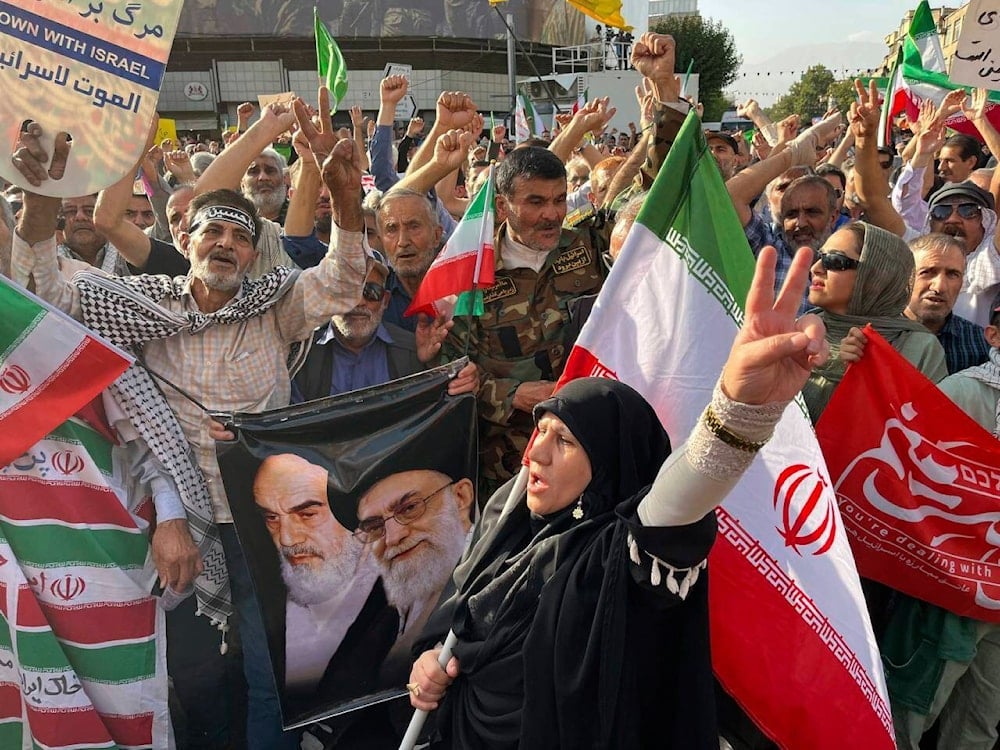Iranian MoFA received proposal to resume nuclear talks: Spox
Tehran confirms the receipt of a proposal to resume nuclear talks, as President Masoud Pezeshkian pledges to rebuild Iran’s nuclear capabilities.
-

Protesters carry Iranian national flags and a poster of the late revolutionary founder Sayyed Ruhollah Khomeini and Sayyed Ali Khamenei, while chanting slogans after attacks on nuclear sites in Iran, in Tehran, Iran, Sunday, June 22, 2025 (AP)
A proposal to resume talks on the Iranian nuclear program has been received by the Iranian Foreign Ministry, government spokesperson Fatemeh Mohajerani confirmed on Sunday.
"The [Iranian] Foreign Ministry has received messages containing a proposal to resume talks on the Iranian nuclear issue," the spokesperson stated, noting that the details of the proposal will be revealed in due course.
On Friday, Iraqi news agency Baghdad Al-Youm reported that the United States had sent a message to Iran via Oman proposing a resumption of the dialogue, which was suspended this summer, although this information was later refuted by several media outlets, including the agency itself.
Meanwhile, Iranian President Masoud Pezeshkian vowed to rebuild Iran's nuclear program in a statement published on Sunday.
According to a quote from his administration's Telegram channel, Pezeshkian stated, "Scientific knowledge is preserved in the minds of our scientists, so by destroying nuclear facilities and factories, [the US] will not create problems for Tehran."
"We will rebuild these buildings, and their capabilities will be even greater," he vowed.
Talks collapse under the weight of unrealistic US demands
The first round of indirect talks between Iran and the United States was held in Muscat on April 12, 2025, with Omani mediation between Tehran and Washington. Iranian officials described the atmosphere as “positive” but stressed that the dialogue would only continue if the United States respected Iran’s sovereign right to peaceful nuclear activity. The discussions focused on sanctions relief and limits to enrichment, but Tehran ruled out any face-to-face meetings.
By early June 2025, sources told Al Mayadeen that progress had stalled as Iran accused Washington of sending “contradictory messages” through mediators. Tehran warned that any move against its nuclear program by the International Atomic Energy Agency would directly affect the talks, signaling growing frustration and setting the stage for the eventual collapse of indirect negotiations.
On June 13, 2025, the Israeli occupation forces launched a sweeping assault against the Islamic Republic of Iran, dubbed “Operation Rising Lion”. The strikes targeted multiple facilities in Tehran, Natanz, and Isfahan, as well as senior commanders of the Islamic Revolution Guard Corps (IRGC) and Iranian nuclear scientists, in what was officially described as a pre-emptive action to damage Iran’s nuclear program.
On June 24, 2025, Iran and "Israel" reached a ceasefire following 12 days of intense exchanges, which dealt significant blows to "Israel" despite its attempts to hide it. Iranian Foreign Minister Abbas Araghchi described the ceasefire as a clear admission of Tel Aviv’s defeat and a strategic turning point in the regional balance of power.
On July 8, 2025, Tehran revealed it had received informal messages from Washington expressing interest in resuming nuclear talks but said that “a minimum level of trust” no longer existed after the US led strikes on Iranian nuclear facilities with the aim of obliterating the entire program. Iranian officials stressed that any new dialogue must respect the country’s right to enrichment and be based on mutual guarantees rather than “empty promises.”
By July 15, 2025, Iran declared that the United States’ continued insistence on halting uranium enrichment made further negotiations “meaningless”. Tehran also criticized Washington’s use of political pressure and threats of sanctions, saying such tactics proved the US was not genuinely seeking a diplomatic solution.
On July 22, 2025, the Iranian Foreign Ministry confirmed that talks with Washington had effectively collapsed, blaming “American obstruction and unrealistic demands.” The statement added that Tehran would no longer pursue indirect negotiations through mediators, marking the end of the most recent attempt to revive the nuclear track with the United States.
How nuclear talks collapsed
On July 20, 2025, the Islamic Republic of Iran and the European troika of the United Kingdom, France, and Germany (often referred to as the E3) publicly announced an agreement in principle to resume nuclear talks.
Tehran emphasized that its right to uranium enrichment must be respected in any future deal, reaffirming its stance that “enrichment is our right, and it must be respected” during the Istanbul-based discussions held later in July.
By August 3, 2025, Iran confirmed that while talks with the E3 were ongoing, the process remained under serious strain with “complex and difficult circumstances.” The Iranian delegation insisted that its sovereign rights under the 2015 nuclear deal must be honored and cautioned against any move from Europe that might rely on political pressure or the activation of snap-back sanctions.
The definitive collapse came on September 28, 2025, when the E3 triggered the snapback sanctions mechanism under UN Security Council Resolution 2231, citing “persistent and significant non-performance” by Tehran of its nuclear commitments.
Tehran swiftly rejected the move as politically destructive, stating that the European action marked the end of meaningful diplomacy under the present framework.

 5 Min Read
5 Min Read








